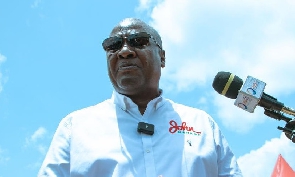 Former President, John Dramani Mahama
Former President, John Dramani Mahama
The proposal of a 24-hour economy by the NDC flagbearer, John Mahama, warrants a critical examination, especially in the context of Ghana's current economic and labor structures. While the idea may seem progressive, its feasibility and implementation in Ghana's existing framework present significant challenges.
To begin with, Ghana's labor system does not predominantly operate on an hourly wage basis. This is a crucial factor to consider when discussing the viability of a 24-hour economy. For such a system to function effectively, it would necessitate a shift towards hourly remuneration. Without this change, the concept of additional hours equating to additional pay remains abstract and unreliable.
Moreover, the implementation of a 24-hour operational model, particularly in government sectors, implies the need for a substantial increase in the workforce to cover additional shifts. This expansion requires a corresponding growth in the economy to sustain the increased employment demand and expanding wage bill.
In the absence of rapid economic growth, the feasibility of maintaining a 24-hour economy across various government institutions becomes highly questionable.
Furthermore, Mr. Mahama's proposition to incentivize the private sector to adopt the 24-hour economy model, primarily through reduced electricity tariffs during off-peak hours, raises concerns about potential labor exploitation.
There is a risk that businesses might simply extend the working hours of their current employees with minimal compensation adjustments, exploiting the lower operational costs without adequately benefiting the workforce.
This approach could exacerbate existing labor inequalities and does not address the fundamental issue of fair compensation based on working hours.
The discipline required to manage a 24-hour economy extends beyond mere policy implementation; it involves a comprehensive overhaul of the current wage system and labor laws to ensure fair and equitable treatment of workers.
Moreover, the success of a 24-hour economy is heavily dependent on the strength and growth rate of the national economy. A robust and rapidly expanding economy is a prerequisite for such a system to thrive. In the absence of this, the idea of a 24-hour economy may be premature and could lead to adverse outcomes, including increased unemployment and labor exploitation.
In conclusion, while the concept of a 24-hour economy in Mr. Mahama's proposal appears innovative, it is imperative to first address the underlying economic and labor challenges. Prioritizing economic growth and restructuring the wage system are essential steps before embarking on such a significant transformation.
Without these foundational changes, the proposal risks being unfeasible and could potentially exacerbate existing economic and labor issues.